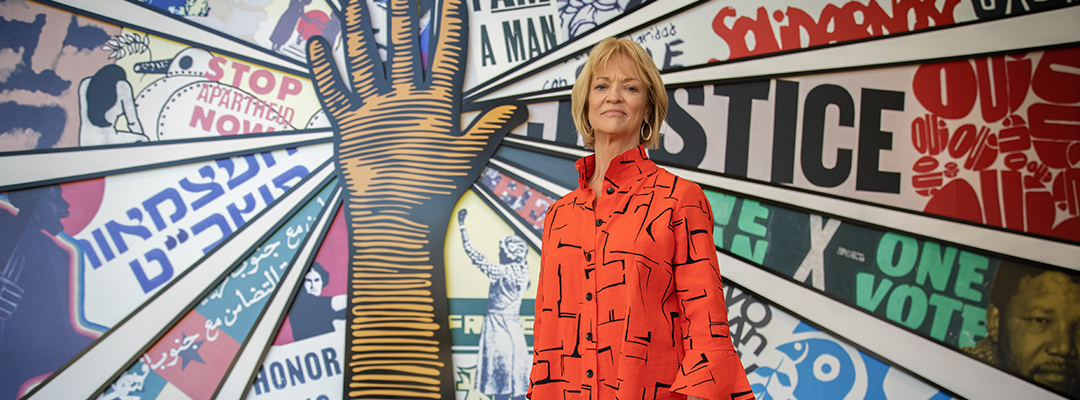
As part of our journey in 2021 and in celebration and partnership with the Atlanta Journal-Constitution Peachtree Road Race, we are sharing the stories of six local heroes who are impacting positive change in their communities. In addition to bringing awareness and education to each of their respective organizations, we will also be donating $10 of every top sold in the Run As One™ Collection at The Peachtree Health & Fitness Expo presented by Publix to support the Atlanta community.
As a volunteer at the National Center for Civil and Human Rights, Julie Smith sees people from all types of backgrounds leave with a new sense of just how important civil rights history is. And how relevant it is today.
“I believe that the Center represents for Atlanta a site where we can look back at our place in history while we look forward to how we can make changes in the world,” Julie says. “We are a diverse and international city and can be an example to the visitors we have from around the country and the world. I hope that after touring the NCCHR, people feel empowered and believe that one person can spark a movement to affect change. The exhibits are full of everyday people who saw something that needed to change and have worked to make that change a reality.”
Like most people who volunteer or work at the NCCHR, Julie’s interest in civil rights began long before she even knew the museum existed. “In 1967 when I was 8 years old, my parents divorced and when my mother remarried our family moved from one suburban county (Cobb) to another (Douglas). It was there in my little town that I first experienced integration in my 4th grade class. Thelma and Joe were my black classmates. At my young age, I didn’t understand the significance of this moment. I just knew that Thelma was my buddy on the playground at recess.
“My future husband grew up in another part of Douglas County and at this same time was being bussed to a formerly all black elementary school. During high school in the 1970’s, I was interested in equal rights for women and marched with my friends to our county courthouse in support of the Equal Rights Amendment. I still have an ERA bracelet from that time that I continue to wear as a reminder that maybe one day that Constitutional amendment will be passed.
“Since then, we have moved to downtown Alpharetta to enjoy city living, traveled, and I’ve been taking classes and finding volunteer opportunities. It was during a discussion with a friend about volunteering that I learned about the National Center for Civil and Human Rights. My husband and I visited the NCCHR for the first time together. Although we both grew up in Georgia, we were unfamiliar with some of the civil rights content. We found the exhibits powerful, inspirational, and many times, shameful. The Center can evoke lots of different emotions.
“After visiting, I wanted to be a part of sharing the stories the Center highlights, so I applied to become a docent. My favorite exhibit at the Center is part of the Civil Rights Gallery ‘Rolls Down Like Water’. The ‘March on Washington’ is a bright and hopeful light after the darkness of the Jim Crow times and the brutality of the Movement during the 1950’s and 1960’s seen in the previous exhibits. It allows you a moment to pause and feel uplifted. When I’m volunteering, I like to stop by there and listen to the songs and speeches.”
Every time she volunteers, Julie meets people from all walks of life, but there’s one particular moment that still warms her heart when she thinks about it. “During Black History Month, the center provides additional children’s programming to fully engage them in the exhibits. This year we had a scavenger hunt for the kids with prizes that they could choose from at the end of their hunt. Another volunteer and I were working at this table, and she asked a young boy what he had learned. He hesitated for a moment, but his dad encouraged him to tell us about Martin Luther King, Jr. ‘You know about him’ his dad said. The little boy looked at me and my fellow volunteer and said ‘Because of MLK, you two can be friends.’ Yes, here we were a black college professor and a white retired business owner who had just been discussing our past struggles raising our children. He was right. We can be friends and talk about our life experiences. These are the times that feed my soul and make me so happy to be a volunteer here at the NCCHR.”
So, what does it ultimately mean to do her part to achieve universal human rights? Julie explains, “To me, universal human rights means we are all born equal and should be afforded equal opportunities and be treated with equal dignity no matter our race, gender, ethnicity, who we love or who we worship, how much we have or don’t have.”
And thanks to the time, effort and kindness of dedicated people like Julie working together for a better tomorrow, the dream of universal human rights is still alive and well.
Unique Stories. Similar Goals. United In Our Desire To Turn Potential Into Positive Change. #RunAsOne #AJCPRR
Published: May 2021
